Acute toothache is one of the most discomfort, which even the most courageous men are not able to endure. What can we say about children who face this problem even when teething. Modern means will help to weaken strong symptom, however, for a full treatment and solution of the root cause, it is still necessary to contact a dentist.
Toothache... how painful it is.
Causes of acute pain
Acute pain in the teeth can be manifested by different reasons, among which are the following:
- pulpitis;
- caries;
- periodontitis;
- periodontitis;
- exposure of the neck of the tooth or dentin;
- cracks in tooth enamel.
When caries destroys the enamel and makes its way to the pulp, there is sharp pain, since in this part of the tooth there are nerve endings through which a signal enters the brain. Usually pulpitis makes itself felt at night, while the pain can radiate to another tooth, spread to the ear or temple. Periodontitis is characterized by inflammation of the gums. The pain manifests itself in the form of pulsating signals, a tumor may occur near the tooth.
Periodontitis is an inflammation of the periosteum, in this place there are important ligaments that hold the tooth in the hole. When the infection penetrates these layers, a cyst or granuloma may be found.
First aid for toothache
What to do first if you suddenly have a toothache? Among the main activities are the following:
- taking analgesics;
- the use of "folk" medicine;
- acupressure;
- treatment or extraction of a tooth in the clinic.
First aid for acute toothache may include the following tips:
- apply a piece of ice to the cheek or gum;
- rinse your mouth soda solution(dissolve a teaspoon of soda in a glass of water);
- take an anesthetic;
- stretch the notch between the large and index finger;
In case of a toothache, in no case should you heat sore spot. With inflammation, this will further aggravate the situation. In the same time cold compress it is allowed to do up to ten to fifteen minutes, so as not to chill the gums.
Taking analgesics
Analgesics are painkillers that dull the signals of nerve impulses. The most effective among them are:
- ketanov;
- analgin;
- nurofen;
- dexalgin;
- dexiclan;
- baralgin;
- indomethacin.
One of the most popular of the above remedies is ketanov. It can be consumed no more than twice a day, its duration is about six hours. With relatively mild pain analgin, dexiclan and dexalgin are used. However, allergy sufferers need to be careful with the second, since it is not suitable for everyone.

Analgesics - their choice today is quite high.
Baralgin will satisfy more severe pain, but it can be consumed in a limited amount due to big list contraindications. Nurofen suffers from the same drawback, but it still effectively relieves toothache. In inflammatory processes, a remedy such as nise is used. Indomethacin also has anti-inflammatory properties.
It should be understood that these drugs do not relieve the cause of toothache. You can use them in order to "reach out" to the doctor's appointment, where a diagnosis will be made and appropriate treatment will be carried out.
"Folk remedies
What to do if you don't have medications, and acute toothache overtook suddenly? You can use the "grandmother's" methods - the means of "folk" medicine.
In order to get rid of a toothache, you can make gargles based on herbs. One of the most popular folk recipes in this case - a decoction of sage. For a glass of boiling water, it will take three to five tablespoons. First you need to rinse your mouth with warm decoction, and then make a compress with it. Plantain tincture not only relieves pain, but also disinfects the oral cavity.
Among the recommendations of "folk" medicine - rinsing with a decoction of chamomile, calendula. A plant such as calamus additionally helps to relieve gum bleeding. You can soothe a sore tooth by making an oil compress tea tree, fir or carnation. You can also apply a cotton swab dipped in propolis or tincture of eucalyptus, valerian.
Among the "folk" remedies for toothache, black radish juice is effective. You can apply a swab to the sore spot, or hold the juice behind your cheek. in an efficient way it also turns out to be the application of a cut clove of garlic to the wrist in the place where the pulse is felt. At the same time, in popular recommendation it is specified that the hand should be opposite the painful side.
Application of acupressure
In addition to the above remedies, you can try to relieve pain with the help of acupressure. To do this, you can press and massage the following points:
- notch between the thumb and forefinger;
- the edge of the index finger on the side of the thumb, slightly below the base of the nail;
- if it hurts lower tooth- the angle of the lower jaw;
- if the upper one worries - the hollow between the nose and lips or between the cheekbone and lower jaw.
These points are on the path of pain impulse transmission, and therefore help to calm the pain. They can be affected for no more than two or three minutes. You can also try an ear massage. For this you need thumb put your hands on the top of the ear and pressing down to the lobe.
What to do if a child has a toothache
The first pain symptoms associated with teeth in a child begin at the age of four to six months, when they are just beginning to erupt. To relieve pain during this period, you can use special means: pastes and gels with anesthetic effect.

Toothache in children headache parents.
The cause of a toothache in a child may be a stuck piece of food that irritates the enamel or presses on the gum. After removing it, you can rinse your mouth with a salt solution (one teaspoon of salt per glass of warm water).
If the child has an acute toothache, you can put a piece of fat on him. If the tooth is affected by caries and the affected area has reacted to temperature or a sharp taste, then you can apply a cotton swab moistened with eucalyptus oil. As emergency remedy a cold compress will help the child: you can attach a piece of cold vegetable or fruit to the sore spot.
Unbearable toothache can be relieved with medical devices. Aspirin is not suitable for a child, but it can be replaced with analgesics such as ibufen and paracetamol. It is important to observe the dosage: no more than half a tablet per day. You need to take one quarter first, and after twenty minutes - the second quarter. Nurofen is a universal pain reliever. It must be taken three times a day, and the dosage for one time depends on the age of the child:
- from six to twelve months - 2.5 ml;
- from one to three years - 5 ml;
- from four to six years - 7.5 ml;
- from seven to nine - 10 ml;
- at ten to twelve years - 15 ml.
Despite the fact that the pain will subside as a result, you should not put off a visit to the dentist. Only in his power to eliminate the cause of this problem. Using "adult" analgesics for children is dangerous not only for their health, but in general for life.
Means acceptable for pregnant women
With acute toothache during pregnancy, you should first try to quench it with means that are as safe as possible for the unborn child. You can apply the rinses described above or moisten a cotton swab vegetable oil, apply "Asterisk" balm on it and attach it to the gum under the aching tooth. The pain can subside with a simple spice of cloves, which can be sprinkled on the gum. Together with pain, the leaf of aloe, kalanchoe and pelargonium relieves inflammation.
During pregnancy, some modern analgesics are also allowed. An important criterion in their selection is that they active ingredients did not pass through the fetal plasma. Antispasmodic action has a no-spa. In the first trimester of pregnancy, hippostad can be used, but it should be remembered that in the first weeks the fetus is most vulnerable.
Paracytamol is safe, but does not cope with severe pain. Nurofen overcomes severe pain, but for the first and third semesters it is categorically not suitable, as it helps to reduce the amniotic fluid.
Sometimes during pregnancy, children's products that are used when teething are saved. For example, calgel has a freezing effect. If the pain is unbearable, you can use one tablet of ketanov.
In case of pain, even in any case, it is necessary to consult a dentist. Exist modern facilities for local anesthesia that will allow the doctor to perform all necessary procedures to relieve you of the cause of the pain.
When an acute toothache occurs, a person forgets about routine troubles. He is only concerned painful sensation which should be removed as soon as possible. Such a misfortune comes unexpectedly and often spoils the whole day. Some people try to get rid of pain with folk remedies. The main thing here is to understand that by eliminating pain syndrome you will not cure the disease. Even the safest and effective methods are an auxiliary temporary measure. At serious problems with teeth folk remedies eliminates the need to visit the dentist. They will only help to endure discomfort until the visit of the doctor.
Application of agave
Currently, there are many remedies that can temporarily relieve pain and minimize inflammatory process. special attention deserves an agave leaf. It has been used since ancient times as an anesthetic. This plant has a unique anti-inflammatory, as well as healing properties.
One agave leaf is carefully cut, washed thoroughly under running water. cold water. Then a longitudinal incision is made with a knife. From the side of this incision, the sheet is applied directly to the gum, located near the diseased tooth. Such homemade compress must be held for five minutes.
If the pain syndrome is not eliminated, then the juice is squeezed out of the cut agave leaf. Then it is poured warm water(750 ml) and rinse the mouth.
Chamomile decoction
One of the most famous ways to reduce toothache is the use of chamomile decoction. It will relieve inflammation and disinfect the oral cavity. Chamomile is a natural antispasmodic. A decoction of this plant will help stop the bleeding.
Against toothache, prepare the following remedy. Dry chamomile (5 tablespoons) is poured with boiling water (200 ml), stirred for half an hour water bath. Then the broth is removed, cooled to 40 degrees. Apply warm.
The broth is filtered, rinsed with it in the oral cavity, giving close attention sick tooth.
Uses of garlic
Garlic is applied to the hand located on the opposite side of the tooth that worries. To do this, the clove is carefully crushed. The resulting garlic gruel is applied to the bandage, and then applied to the wrist. The result is an effect similar to acupuncture. Garlic juice, stimulating certain points on the hand, reduces toothache. If the skin burns strongly under the bandage, then it is better to remove the bandage and rinse the hand with warm running water. No need to endure discomfort, because a pronounced burning sensation is fraught with tissue burns.
Application of rinses
With acute toothache, you can use soda and salt. Based on them, a solution is prepared. Soda and salt (1 tsp each) are diluted in warm water(150 ml), then shake. It turns out a homogeneous composition, which is used to rinse the oral cavity. The procedure must be performed every 15 minutes. Such a tool will produce a slight disinfecting effect.
Suitable for toothache and sage. It contains flavonoid and tannic compounds. Therefore, this plant will achieve an anti-inflammatory and antibacterial effect. Sage also contains galenic forms that will have an antispasmodic effect. To prepare a pain reliever, you need to pour dry raw materials (1 tablespoon) with boiling water (200 ml) and insist for half an hour. Then the resulting infusion of sage is filtered, brought to the original volume, adding a little water. oral cavity rinse every two hours, using a freshly prepared infusion.
Plantain will also help eliminate toothache. Take dry grass (1 tablespoon) and pour boiling water (200 ml). The resulting composition is filtered, brought to the initial volume. Infusion of plantain rinse your mouth every 10 minutes.
Tooth drops
To achieve an analgesic effect, apply tooth drops based on valerian root, oil peppermint and also camphor. Such funds have an antiseptic, anti-inflammatory, sedative and disinfectant effect. Just one drop is applied to sterile cotton wool and applied to the aching tooth. True, in some cases an allergic reaction may occur. Such a remedy is unacceptable for epileptics, as well as for those who are prone to convulsive seizures.
Tablet preparations
A popular remedy for toothache is analgin. It is taken orally one tablet per day. Daily dose should not be more than one gram. To enhance the effect, some people take a whole tablet of dipyrone and apply it directly to the surface of the diseased tooth. However, it should be understood that analgin is not devoid of side effects. It can cause allergies. At long-term use sometimes there is agranulocytosis and leukopenia. AT childhood and during pregnancy, aspirin should be used with caution. It is unacceptable to use this remedy for violations of the liver and kidneys.
A pronounced analgesic effect will be produced by Ketanov tablets. They will relieve inflammation, lower body temperature. To stop acute toothache, it is permissible to use one tablet every four hours for adults. However, the drug should not be used for more than one day. Ketanov should not be used during lactation or pregnancy. This drug has a whole list of side effects. It causes disruption of cardio-vascular system and gastrointestinal tract, stomatitis, sometimes there are problems with the functioning of the hematopoietic, respiratory, urinary systems.
Paracetamol is also used for pain relief. Such an analgesic-antipyretic eliminates toothache when taken up to four times a day, 500 grams each. However, this drug should not be used for more than five days. It negatively affects the work of the digestive, hematopoietic system, causes allergic reactions. Such a remedy is undesirable for pregnant and elderly people, as well as for those who suffer from kidney and liver ailments.
Since most tablet preparations are not without contraindications and side effects, people often prefer folk remedies. However, it should be understood that any medications only temporarily stop the pain syndrome. To get rid of the pain forever, you need to visit the dentist and identify the root cause of this manifestation.
Toothache happens to each of us at least once in a lifetime. There are many reasons for its appearance: the long-awaited wisdom tooth grows, the rest of the tooth under the crown ached, the nerve became inflamed, the old filling fell out, etc. We will find out what to do with acute toothache, for what reasons it may appear, what medicinal and folk remedies can help to cope with it promptly.
Each of us understands that acute toothache is a real test. It can be very painful and can really knock a person out of the usual rhythm of life. Acute, strongly throbbing pain in the teeth does not allow sleep, eat, not to mention any daily affairs. It is not surprising that the person who encountered her will try to get rid of her as soon as possible.
But it's best to take care of enough good care for teeth and gums. Perhaps in this case, the toothache will not visit you. It is important to visit the dentist twice a year. Then he will be able to notice the problems that have appeared on initial stage their development. You need to brush your teeth regularly, morning and evening. It is important to do the right movements for 3-5 minutes. They should not be very intense, but not too light. On the Internet, you can find videos that describe in detail how to brush your teeth properly. Use a medium to hard brush for this. If the brush is too soft, its bristles will not be able to cope with plaque between the teeth, and also will not be able to massage the gums well enough. You should also floss your teeth at least twice a day. It will help remove plaque between the teeth and even behind the gum. This will prevent the formation of tartar. Try to eat less sugary and fatty foods. Not good for the teeth and smoking, as well as drinking alcohol. If you feel pain, it is better to contact your dentist immediately so as not to wait for its acute form.
But if you still have an acute toothache, what to do? As you know, even the most hardy and persistent person will not be able to endure it. It is considered one of the most severe and excruciating types of pain. That is why it is worth knowing in advance what methods you can deal with it. The choice of these methods will depend on the specific reason provoked pain, where it is localized. Therefore, it is important to establish why the tooth still ached. After all, it is important not only to overcome pain and above all, eliminate their cause. For this, it is best to consult a dentist. After all, he is armed not only with his own many years of experience, but also modern technologies treatment and diagnosis. For example, only a specialist can determine the cause of excessive tooth sensitivity or identify pulpitis.
But while you get to the dentist, pain can and should be fought. It should not unsettle you. First you need to determine which tooth is causing pain. Then carefully examine it in the mirror. Try to remember if there was a filling on it. Sometimes pain can even occur from the fact that a wisdom tooth erupts.
Pain when teething wisdom teeth
The wisdom tooth grows quite late (up to 23 years and later). It is one of the largest and is located at the very end of the row. Due to its size, it can cause significant pain in the process of its appearance. In this case, the gums can swell and hurt badly. This tooth is chewing, and sometimes quite strong loads fall on it. During the normal process of developing a wisdom tooth, there should be no pain, but sometimes this process is disrupted. Then there are pain sensations.
Pain during the eruption of a wisdom tooth may appear in such cases:
- If the direction of growth of this tooth is wrong (towards the seventh next standing tooth or towards the cheek);
- The gums are inflamed.
Need to know what slight pain and discomfort are quite possible with the appearance of a wisdom tooth. The pain may come and go intermittently. The whole problem is that when this belated tooth appeared, the entire jaw had already formed. In addition, if many teeth had their milk predecessors, then there are no milk wisdom teeth. This means that the path in the gum was not paved for him. This tooth is cut long enough, because of which the pain appears and then disappears again. If you experience acute pain, and it bothers you constantly, then you should go to the doctor.
Acute pain when a wisdom tooth appears can be relieved. But only a dentist can do this. To this end, he will remove the so-called hood on the gum, which is located directly above the tooth. This procedure boils down to the fact that the doctor gently cuts the gum over the tooth. Thanks to this, it is cut without acute pain. At home, you can also try to influence the situation. In such cases, it is useful to rinse your teeth with a solution of salt and soda. If the pain is too strong, you can use an analgesic. But this is an extreme measure.
If a tooth aches that is hidden by a crown
If you have a crown installed, this does not mean at all that the tooth under it cannot ache. What to do in such a case?
If you were unpleasantly surprised by the pain that appeared immediately after the crown was installed, then we hasten to reassure you. This is perfectly acceptable and normal. Immediately after the installation of the crown, the tooth may ache a little. This may continue for several days. But if you wear a crown for a long time and notice that the tooth under it began to hurt, then there is a reason to be wary. It is important to establish why the discomfort appeared, and only your dentist can do this.
Here are a few reasons why a tooth under a crown can hurt:
- The dentist did not properly prepare your tooth before installing the prosthesis. It is on how well the tooth is prepared that depends on how successfully you will wear the crown placed on it. Before installing the crown itself, the doctor must completely seal the canal of the tooth in which there was inflammation. At the same time, it is important that he uses only materials High Quality. Feel free to discuss all of these points before the crown placement process begins.
- There is a hole directly in the wall of the dental canal. Such a hole may appear if the doctor does not have enough experience and inaccurately installed the pin.
- If the crown itself was installed incorrectly. It is important that the doctor does not violate the technology of installing the crown and has enough experience.
- If the tooth nerve is inflamed. In this case, there is a rather sharp and throbbing pain.
In any of these cases, you will need to go to the doctor. But if the pain occurs at night or just before the doctor sees you, you can take your usual pain reliever. This advice does not apply to pregnant women. Recommendations for them will be in our article a little later. It is advisable to take the remedy that the doctor has previously prescribed to you. In any case, do not overuse analgesics, as they can cause serious side effects.
You can make your own rinse, which can soothe the pain for a while. Preparing such a tool is quite simple. It will take half a glass of novocaine, salt (fine) and 1 egg white. These ingredients need to be mixed and rinsed with an aching tooth.
Another simple remedy that is available at home. To the place where the alleged focus of acute pain is located, you need to attach a sterile piece of gauze soaked in a solution of hydrogen peroxide. This simple application is able to relieve inflammation for some time, because of which the pain began.
Herbalists recommend rinsing a sore tooth with an infusion of one of the listed herbs. It can be sage, thyme, calendula or the familiar chamomile. All these herbs are able to reduce inflammation. They are excellent antiseptics. The proportion used is as follows: for 1 liter of water, take a tablespoon of dry grass. Boil this mixture in a regular water bath, and then let it brew a little. With this decoction, you should thoroughly rinse the aching tooth 3-4 times a day after meals.
Remember that all these measures can only help temporarily. It is impossible to relieve pain under the crown completely at home. This is only possible for a doctor. Therefore, without delay, go to the dentist.
Sore tooth nerve (root)
Pain during inflammation of the dental nerve (aka the root of the tooth) is considered one of the most painful, acute and unbearable. Long time it is simply impossible to endure, and it is not necessary. This pain occurs due to the inflammatory process. Its cause is an infection that gets into the very depths of the tooth, to its root. In this case, the nerve becomes inflamed, causing a throbbing sharp pain. This problem can be solved in two ways. Choice specific method The decision will depend on the degree of the infection process, as well as on the stage at which the inflammatory process itself is located.
Option one. It is suitable if the infection has not had enough time to damage the tooth tissue. Then it can be kept, as they say, alive. The nerve is not removed. This is very important, as the tooth will continue to receive the necessary nutrition.
Option two. It is somewhat worse, as it involves the removal of the nerve. Such a tooth is considered “dead”, since it is the nerve that provides its response to stimuli, as well as good nutrition tooth tissues.
There are several ways to remove a tooth nerve:
- You can "kill" the nerve with arsenic. This method is quite painful. It is carried out in several stages, so there will be several visits to the dentist. We hasten to reassure you. Nowadays, this method is considered obsolete and is practically not used. Arsenic has been replaced by modern highly effective pastes. In addition, high-quality anesthesia is used. Previously, this procedure was performed in this way. During the first visit, the dentist had to open the nerve, clean the canal well and put arsenic into it. Then a temporary filling was placed. Arsenic is able to destroy the damaged nerve, but the whole process was accompanied by simply unbearable sharp pain.
- The modern method is much more humane. The doctor makes a painless injection of anesthesia (local), opens the diseased nerve, cleans the canals and puts a permanent filling. Sometimes pawned medical paste and a temporary filling is placed. But there is no such pain as when using arsenic. Most often, the dentist copes with this problem in one visit.
At home, as you understand, it is impossible to solve the problem of an inflamed nerve. It is important to go to the dentist as soon as possible. Choose your dental office modern equipment and experienced professionals. It doesn't have to be darling at all private clinic. The district clinic will also provide you with worthy help provided that an experienced dentist takes over the case. After all, the removal of a nerve is a responsible and delicate matter. There is a row here important details that need to be taken into account. For example, it is important to clean the channels well and seal them properly. To track the result, the doctor should refer you to an x-ray. Only when he is completely sure that the channels are sealed with high quality, it will be possible to install the final seal.
Analgesics, which we often use, are able to relieve pain for a certain time. In order not to endure pain, you can take No-shpu, Tempalgin, Analgin, Solpadein or Baralgin. Any of these drugs will relieve pain for a while. You can also gently rinse your mouth with a solution of soda, salt or a decoction of sage, chamomile, calendula.
Pain after tooth extraction
Although a local anesthetic is used during the extraction of a tooth, it will subside over time and the pain can become quite severe. Especially often, the pain worries when it was necessary to cut the gum for removal, if the bone tissue was broken, and sutures were also applied. Even if the removal went without complications, the integrity of the tissue was still broken, so the gums may hurt for some time.
Sometimes pain appears from the fact that after removal, an inflammatory process began in the gum.
Most common causes inflammation can be:
- Improper care of teeth and mouth;
- When extracting a tooth, the doctor did not take care of proper hygiene;
- The doctor was inattentive.
What to do if there is acute pain after tooth extraction? The main warning - you can not warm your cheek or the place where you were extracted tooth. This may lead to the development purulent process. To ease the pain, rinse your teeth with decoctions of herbs. Suitable sage, calendula, chamomile, calamus, oak bark. At the same time, it is not necessary to rinse too much, so as not to remove blood clot, which was formed in the hole from the tooth. This clot is very important. It is he who is reliable protection from infection. Later, it will drag into the gum and help in the formation of bone tissue. You can't absolutely delete it! Therefore, rinse your teeth very carefully. It's not even a rinse. You just need to put the decoction in your mouth and hold it behind your cheek in the place where you feel pain. Give him time to act. You can not eat after such a procedure. Therefore, it is better to do it immediately after eating. At the same time, you will remove the remnants of food.
If the pain is too strong, it is worth taking some kind of analgesic. In this case, you need to see a doctor again.
If the filling fell out
Even the highest quality filling can fall out of a tooth that has already been treated and did not bother you. What to do to appease possible pain? Since a canal opens due to a fallen filling, discomfort and pain may appear. It can also contain food. If the filling is temporary, then there is no reason to worry. You will be given a permanent filling. Just put a sterile cotton swab in its place. But if the fallen filling was permanent, then you should urgently go to the dentist. This will save you from a possible inflammatory process. Remember, if you renew the filling sooner, then this the process will pass for you quickly, painlessly and without unnecessary actions. It is best to restore the filling on the same day.
If it was not possible to get to the dentist on the day when the filling fell out, then make every effort to keep the opened channel clean. To do this, brush your teeth 2-3 times a day, rinse your mouth after eating. Food should not collect in the “funnel” formed from the filling.
If the pain appeared in the filled tooth
Sometimes it happens that a tooth starts to hurt, which has already been treated and a permanent filling has been installed. If the pain appeared immediately after this procedure, then do not worry. She'll be back in a few hours. You can take a mild pain reliever. If a day has passed, but it does not subside, then, apparently, the seal was installed unsuccessfully or hygienic requirements were violated during its installation. Worth going back to the doctor. If the cause of the pain is an incorrectly installed filling, it will be removed and a new one put in. If the doctor has not cured the tooth, then it will be necessary to open the seal, treat the tooth and install a new one.
Another cause of pain is an allergy to the material from which the filling is made. In this case, you need to install a new seal from a different material.
If the gum is swollen
Pain can be caused not only by inflammation in the teeth, but also in the gums. At the same time, it swells, pain occurs. Contact your doctor immediately. It is only in his power to establish the cause of the swelling and quickly eliminate it. At the same time, remember that swollen gums cannot be heated categorically! This can lead to the formation of pus and serious complications. Rinse your mouth antiseptic solution. A solution of ordinary soda will do. You can also use herbal decoctions. You can also apply a cotton swab soaked in hydrogen peroxide to the inflamed gum. If the pain is sharp and difficult to endure, drink one of the suggested remedies: No-shpu, Ketanov, Solpadein ...
But even if the pain has left you, visit a doctor. He must carefully examine the gum and prescribe treatment.
toothache during pregnancy
In pregnant women, toothache appears quite often. Not the last role in this is played by the fact that during pregnancy the general hormonal background. Because of this, blood circulation in the mucous membranes is disturbed, inflammatory processes may occur, the teeth become much more vulnerable. Another reason is a lack of calcium. During the third trimester, when active formation skeletal system fetus, teeth can suffer greatly. The structure of the enamel is broken, caries may appear. It is important not to panic and seek help from a dentist as soon as possible. The sooner you do this, the less manipulations will be required during the treatment.
But what if there is a sharp pain? She does not need to be tolerated. But remember that there are painkillers that are strictly contraindicated during pregnancy. It is important that such a remedy is selected exclusively by a doctor. He must take into account the duration and course of pregnancy, possible complications, your chronic diseases. If it is not possible to immediately contact the dentist, then you can try to relieve the pain at home. Wherein:
- Remove food debris from the oral cavity as carefully and gently as possible. To do this, simply brush your teeth, and then rinse your mouth with a solution of baking soda or warm water.
- Moisten a clean cotton swab with some tooth drops and put this compress around the aching tooth. Propolis may also be suitable.
- To relieve pain, you can use the familiar seasoning of cloves. It must be poured with boiling water, let it brew and then rinse your mouth. You can use herbal rinses.
If the pain is unbearable, try to contact the doctor and find out which remedy will not harm you and the fetus. Do not self-medicate!
But there is no reason to be upset. Even if you need to take an x-ray, the fetus will be protected by a lead apron. X-rays do not penetrate through it.
So, the most correct decision, if you feel a sharp pain in your teeth, contact your dentist for qualified help. We have tried to cover all possible reasons the appearance of such pain and your actions in each case. If it is not possible to see a doctor right away, for example, you are on the road, then it is important to know some methods for eliminating this pain:
- Rinsing. It can be herbs (we have already called them several times) or a soda solution. The infusion should not be hot. And with swollen gums, the water temperature should generally be at room temperature. Do this several times a day. Good antiseptic- chamomile. Oregano, calendula, valerian, sage can relieve pain.
- Painkillers. Take them only if you understand that you cannot endure acute pain. During pregnancy, do not pick up such drugs on your own! Before taking them, read the enclosed instructions very carefully. The recommended dose must not be exceeded! Do not combine them with alcohol, because painkillers and alcohol do not mix well. The well-known Analgin relieves pain quite well. But it should be taken no more than 4 tablets per day. It is also categorically contraindicated in pregnant women, during lactation, as well as in diseases of the liver and kidneys. Nurofen is contraindicated for those who suffer from ulcers, visual and hearing impairments. Ketanov is recommended to be used only with the permission of a doctor.
Greetings, dear readers. Today's topic of the article is familiar to many of you. This is one of the main troubles that accompany mankind throughout the history of its existence - acute toothache. The causes of the phenomenon are numerous, therefore, for each specific case, a diagnosis is required to find out the nuances and prescribe the appropriate treatment.
Acute toothache - how to relieve
From our article you will learn why acute toothache can appear, whether it is always associated with dental diseases, how to help yourself at home and what the doctor will offer. We will also talk about diagnostics to determine the cause of the problem. How dangerous is this unpleasant symptom?
Causes of pain
Why do people get toothache? You can complain about the environment and other problems. But this is only the visible part. The main trouble is that the future patients of dentists themselves do not understand what dental care is. They forget about hygiene, do not treat caries, open metal caps with their teeth, etc. That is, they behave as if they have titanium teeth in their mouths, and not fragile enamel-covered dentin structures.
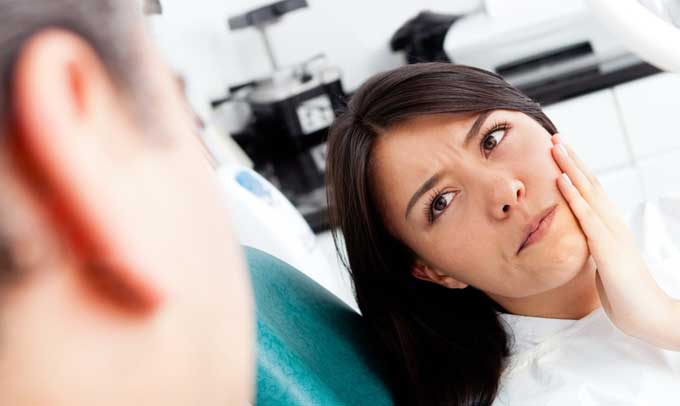
Now you are beginning to gradually realize the main causes of the problem - irresponsibility, lack of proper hygiene. Let's not forget that the quality of treatment in city clinics has always left much to be desired. Doctors in 15-30 minutes need to solve problems that require at least an hour. What to expect from such treatment? Of course, dental problems will not be eliminated. They will get worse, they will manifest themselves as severe pain.
What diseases cause toothache? Let's try to understand this issue.
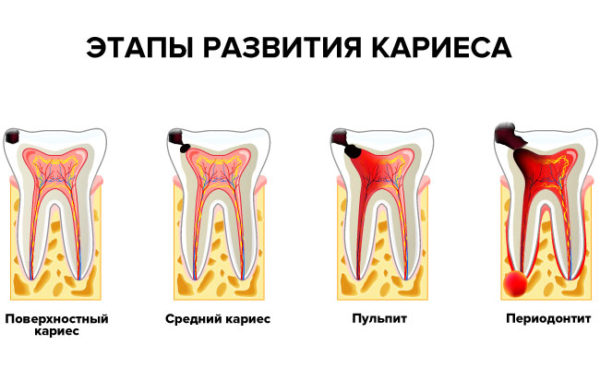
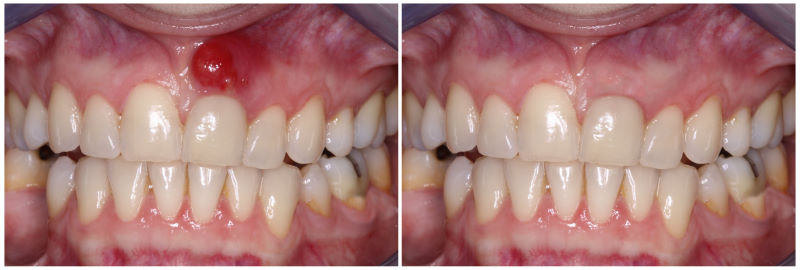
Symptoms and Features
What is acute toothache, no one needs to explain. But it can manifest itself in different ways. It can be a constant feeling or attacks lasting from a few minutes to several hours. In some cases, the pain manifests itself at random times, in others it intensifies in the evening, becoming unbearable at night.
It is also not uncommon to react to hot, cold, salty, sour, spicy, etc. If the tooth “twitches” and the pain is paroxysmal, it is most likely pulpitis.

Diagnostics
Pain is not a disease, but a symptom. Therefore, the doctor needs to determine what exactly caused her appearance.
- If there is a hole in the tooth, it is not difficult to understand the reason. But it can be completely invisible. Either the hole is small on the outside, and inside there is a large cavity with a destructible pulp.
- In the case when there is no visible cavity in the tooth, an x-ray should be taken. For this, X-ray equipment or more of it is used. modern analogues- radiovisiographs. The latter are more accurate, more reliable, and irradiate a person during operation much less.
- It is important to make sure that the cause of the problem is the teeth. If the jawbone is inflamed, the treatment is much more difficult, and the complications are more dangerous.

Self-help before visiting a doctor
Often the problem occurs at night, on weekends or on holidays when your dentist is not working. What can be done to alleviate the condition? There are several key points. This is something you can do without hurting yourself.
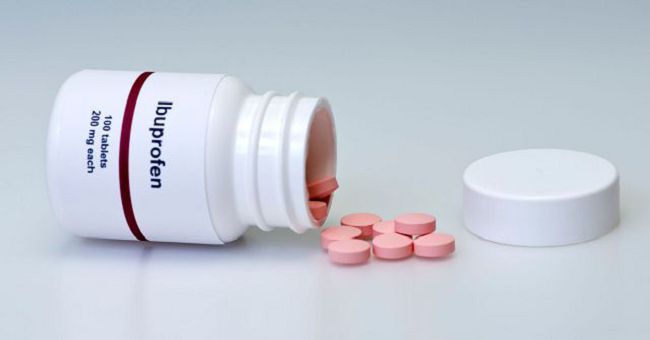

By the way, about analgesics. Analgin itself is one of the most harmful drugs among all that you can drink with a toothache. Prohibited during pregnancy breastfeeding, with anemia, diseases of the kidneys and liver, other functional disorders. In many countries, it was excluded from pharmaceutical catalogs a long time ago and safer analogues are used.
Ketanov / Ketorol / Ketorolac. It is considered the most powerful pain reliever. But there are no less contraindications than analgin. It is often not dispensed without a prescription, since it has become used by lovers of "substances".
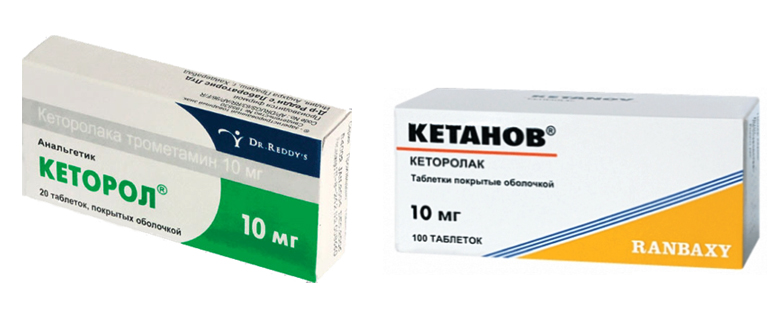
What else can be done to soothe a toothache at home?
- If there is a hole in the tooth (and it also helps without it), hold a sip of vodka over the sore spot. Alcohol quickly penetrates through the gum. Reminds light effect local anesthesia. But the effect, unfortunately, is temporary. Therefore, you should not expect that in this way you will solve the problem itself.
- The human body is a large and complex computer. That's why it works on the same principles. This can be exploited by tricking the brain. First aid is simple. Massage the area between your thumb and forefinger. Nerves pass through this area. The very ones through which signals of toothache are also sent. By sending a kind of "spam" through these channels, you partially alleviate the condition. Nerves cannot handle two streams of information at once. 5 minutes of friction and pressure, and your actions will become the “main signal”, displacing the toothache.
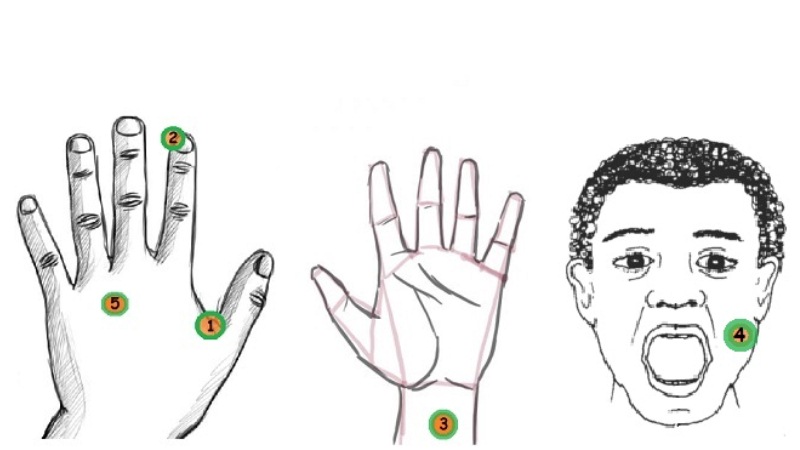
What to do if nothing helps? Nervous system of a person and the organism as a whole is a very specific mechanism. Sometimes nerves, psychosomatics, etc. lead to the fact that the pills no longer help. Or a person has an individual reaction to the drug. Even worse, when you often drank painkillers and it just stopped working on you.
If an acute toothache is unbearable, and the time is such that even the dentist on duty does not work, there is only one way out - to call ambulance. Injectable drugs always more efficient. Sometimes you have to inject not only an anesthetic, but also a sedative, other means. After all, pain leads to vasospasm, increased arterial blood pressure and other problems. And this happens even in young people. Acute toothache is not labor pain. It should not be tolerated.
- It is useless to lay aspirin inside the carious cavity. It only helps by dissolving in your stomach. And even then the pain is unlikely to relieve.
- Do not use honey and any recipes based on it. The sugars that make up its basis are an ideal food for carious bacteria.
- Do not use warm compresses or bandages. They increase inflammation.

Acute toothache - dental treatment
The best thing you can do to relieve acute toothache is to go qualified treatment at good dentist. He will not only eliminate this unpleasant symptom, but also determine the cause, help to cope with it.
- Do not rush to remove teeth that hurt. Often they can be saved.
- Often it is necessary to remove the nerve, as the bacteria have already begun to actively destroy it.
- In some cases, doctors try to preserve its root part.
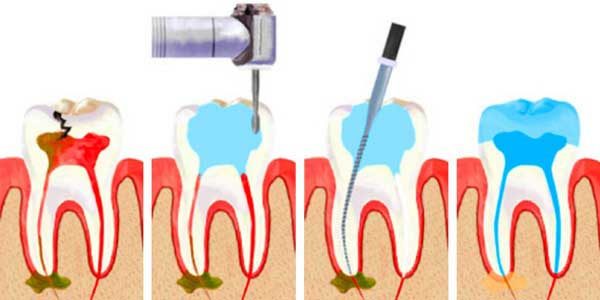
When the patient comes to the doctor, he conducts a visual examination. If there carious cavity, it is cleaned, dead tissue is removed, treated with an antiseptic and sealed. If the carious tooth is sealed, but continues to hurt, this means that the inflammation has engulfed the tissues near the root. The channels are cleaned again, the medicine is injected. A picture should be taken to find out the condition of the periodontium and jaw bone.
Acute toothache in pregnancy
Many are interested in how to remove a sharp one. Before you get to the doctor, you need to somehow fix the problem. After all strong tension harm the fetus. The future baby perfectly feels the state of the mother. Powerful NSAIDs can harm the baby. Therefore, for the time being, it is better to remove them out of sight so that you do not swallow pills in a fit. When choosing between analgesics, it is important to know their features.
- Paracetamol is considered safe, but it is more of an anti-inflammatory agent and may not help with severe pain.
- Nurofen is allowed only in the first and second trimesters. In the III trimester, its use can cause a decrease in the amount of amniotic fluid.

When a pregnant woman goes to the doctor, she must warn him. After all, on early dates he may not notice that she is pregnant. The use of anesthetics with adrenaline is prohibited.
Now there are many sites that publish information about the compositions medical preparations. It usually indicates whether they can be taken during pregnancy, and if so, for how long. Sometimes it is indicated that the substance does not penetrate the placental barrier. This means it is safe.
Acute toothache in children
It is most difficult when dental problems affect children. The smallest are not even able to really explain what exactly worries them. And it can hurt both dairy and permanent tooth. Do you think the problem is pulpitis? In most cases, it is. But there are other reasons for this state of affairs. For example, diseases involving bone tissue the jaw itself. The child cannot pinpoint the source of the pain. Because if pediatric dentist did not find a hole, it is best to take a picture.
![]()
So, how to relieve acute toothache in a child?
- If the cause is a cavity in the tooth, place a small swab containing clove or mint oil. The substances contained in them will help relieve inflammation and reduce soreness.
- Massage upper part auricle baby from the side of the diseased tooth. The procedure takes five minutes or more.
- If the child is not allergic to bee products, you can temporarily close up the hole. It is a powerful natural antiseptic and will alleviate the condition.
All these methods are safe and quite effective. But do not forget that in this way you only temporarily relieve the symptoms. Treatment such procedures can not be called.
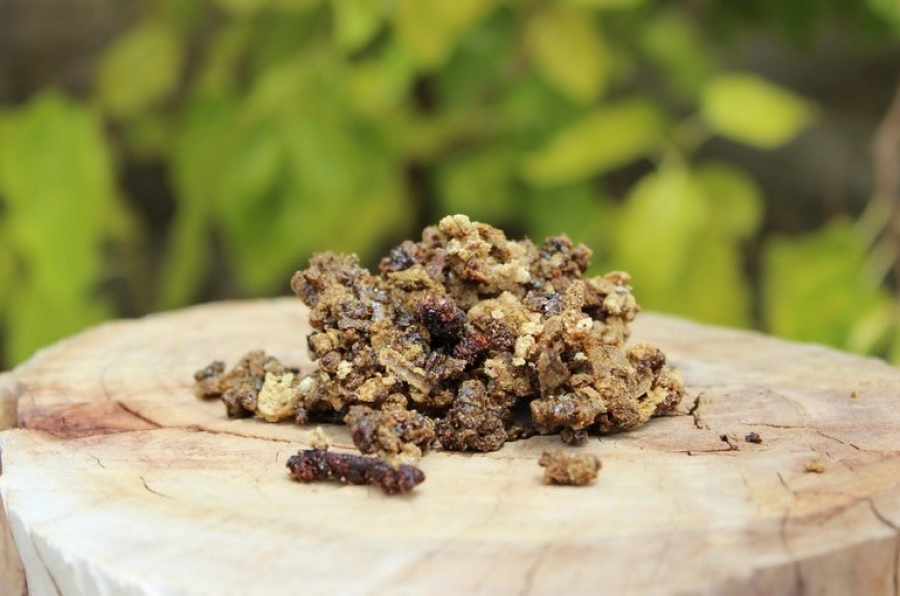
Ointments that are used for teething can be effective for other painful symptoms. Of course, this is only temporary help, but it is better than if the child simply endured.
ethnoscience
In books, newspapers, and now on the Internet, you can often read about folk remedies that relieve toothache. This is not to mention the thousands of "healers" and "psychics" who, for a modest or not very fee, relieve any pain. Some are ready to work from a photo, and people with pulpitis are told that damage is to blame. But we will talk not about charlatans who make money on the medical illiteracy of the population.
What should people know who use folk recipes?
- Attempts to "kill the nerve" are useless.
- Even if you just endure and the pulp dies, then the natural process of its decomposition will begin. Pus will collect inside the pulp chamber. An increase in its amount will lead to the fact that the body will be forced to look for ways to withdraw. First to the top of the root, then - through the fistulas in the gums, cheek, chin.

If the described processes are not treated, this can end sadly for the patient. In particular, one of the most dangerous complications is blood poisoning - sepsis.
What can be done?
- Rinse with salt and soda. If there is a purulent inflammatory process, the outflow of pus will accelerate.
- Relieve inflammation with a tampon fir oil. But this remedy is not able to eliminate the pain.
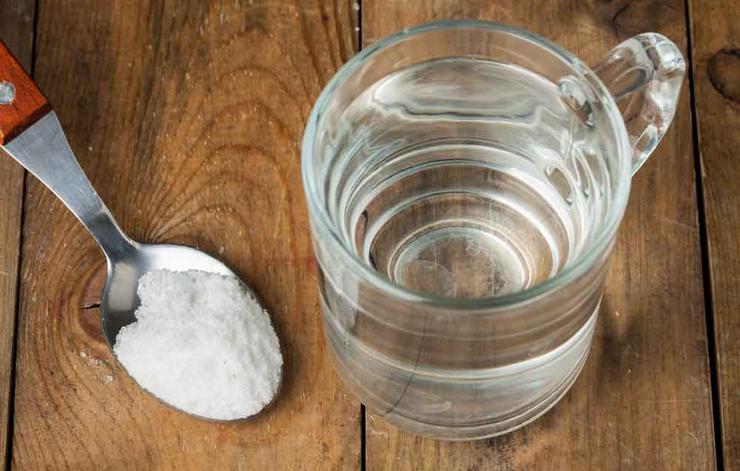
It is possible to clog a tooth with propolis only to cover the hole so that food does not get there. But the product will begin to absorb bacteria. Its antiseptic possibilities are by no means unlimited.
All rinses help solely due to the temperature of the liquid. Because herbal infusions are unable to eliminate pain by themselves. They can only have anti-inflammatory and antiseptic properties.

So where do you turn to get help to relieve acute toothache? Obviously not to traditional healers. After all, the task is not just to save you from this feeling. It is necessary to find out what exactly hurts, and not to let the process destroy the root of the tooth, the tissues surrounding it and the jaw bone. It is also important to stop the spread of the infection.
AT dental clinics patients with acute pain are admitted without waiting. It is enough to contact the registry and the problem will be quickly resolved.
Video - How to relieve a toothache





